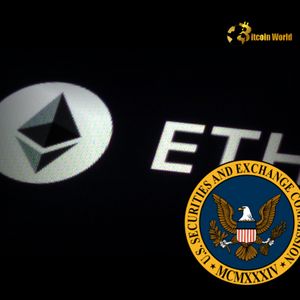BitcoinWorld Ethereum ETF Staking Hit By Shock SEC Delay Are you following the exciting, and sometimes frustrating, journey of the Ethereum ETF in the United States? There’s been a notable development concerning one specific application that has caught the attention of the crypto market. What’s the Latest From the SEC Regarding Franklin Templeton ? Recent reports indicate that the U.S. Securities and Exchange Commission ( SEC ) has taken a step back regarding a key feature in one of the pending spot Ethereum ETF applications. Specifically, news circulating from sources like @PhoenixNewsIO on X, cited by Odaily, suggests the SEC has requested that Franklin Templeton remove the staking component from their proposed Spot Ethereum ETF . This isn’t an outright rejection of the ETF itself, but rather a specific instruction regarding a feature that many applicants included to make their products more appealing to investors. It signals the SEC ‘s continued scrutiny over aspects of cryptocurrency that blur the lines between commodities and securities, particularly crypto staking . Understanding Crypto Staking and Why It Matters for an Ethereum ETF So, what exactly is crypto staking , and why is its potential inclusion (or exclusion) in an Ethereum ETF such a big deal? In simple terms, crypto staking on proof-of-stake networks like Ethereum involves locking up cryptocurrency to support the network’s operations, such as validating transactions and securing the blockchain. In return for staking their Ether (ETH), participants can earn rewards, similar to earning interest in a traditional bank account or dividends from stocks. For an Ethereum ETF , the idea was to potentially stake a portion of the underlying ETH held by the fund. This could offer investors a yield on their investment on top of any potential price appreciation of ETH. This yield component was seen as a significant advantage, potentially making the ETF more attractive compared to simply holding ETH directly or through other non-staking investment vehicles. Potential Benefits of Including Staking in an Ethereum ETF (Now Delayed for Franklin) Potential Yield: Earn passive income on the underlying ETH holdings. Enhanced Investor Appeal: Makes the ETF potentially more competitive and attractive to a broader range of investors seeking yield. Network Participation: Indirectly supports the Ethereum network’s security and operations. Challenges and SEC Concerns Regarding Crypto Staking The SEC ‘s stance on crypto staking has been a subject of debate. One major concern revolves around whether staking services constitute an investment contract, which could classify the staked asset (or the staking service itself) as a security under U.S. law. This has significant regulatory implications. Other concerns might include: Custody Complexity: How the staking process and earned rewards would be managed and secured within the ETF structure. Slashing Risk: Although rare, staked ETH can be penalized (slashed) if the validator node acts maliciously or goes offline, potentially impacting the ETF’s assets. Regulatory Clarity: The overall lack of clear regulatory guidelines specifically for staking services offered to large investment vehicles. What Does This Mean for the Broader Spot Ethereum ETF Landscape? While this specific report is about Franklin Templeton ‘s application, it likely has implications for other applicants as well. Major players like BlackRock, Fidelity, Grayscale, and others also have pending applications for a Spot Ethereum ETF , and many had initially included staking features. This request from the SEC suggests a potential standardized approach: the regulator may require all approved Spot Ethereum ETF products to exclude staking initially. This would simplify the regulatory approval process by removing a contentious element and aligning these ETFs more closely with the structure of approved spot Bitcoin ETFs, which do not involve staking. If staking is universally excluded, it could impact the potential returns for investors compared to holding and staking ETH directly. However, it might also pave a clearer path for the ETFs to receive approval, potentially opening the door for broader institutional and retail access to Ethereum exposure through a regulated investment product. Let’s look at a simplified comparison of potential scenarios: Feature Potential Staked Ethereum ETF (Delayed) Likely Approved Non-Staked Ethereum ETF Holding ETH Directly (with Staking) ETH Exposure Yes Yes Yes Potential Yield from Staking Yes (if allowed) No Yes Regulatory Structure Complex/Uncertain Simpler/More Certain (like Spot Bitcoin ETF) Self-regulated Accessibility Via Brokerage Account Via Brokerage Account Via Crypto Exchange/Wallet Custody Risk Managed by ETF Provider Managed by ETF Provider Self-custody risk This table highlights that while a non-staked ETF might lack the yield component, it could be the necessary compromise to gain regulatory approval and offer a familiar, regulated investment wrapper for gaining exposure to ETH. What Does This Ethereum ETF Delay Mean for Investors? Actionable Insights For investors eagerly awaiting a U.S. Spot Ethereum ETF , this news, while potentially disappointing regarding staking yield, doesn’t necessarily mean the end of the road for approval. It could simply be a step in the negotiation process with the SEC to get the structure right. Here are some key takeaways and actionable insights: Patience is Key: The regulatory process is often slow and involves back-and-forth between issuers and the SEC . Delays and requested amendments are common. Focus Shifts to Core Approval: The market’s attention may now pivot more towards the likelihood of *any* Spot Ethereum ETF approval, even without staking, by the key deadlines in May. Understand the Product: If an ETF is approved, understand whether it includes staking or not, as this will impact potential returns. Direct ETH vs. ETF: Consider the trade-offs between holding ETH directly (which allows for staking if you choose) and investing in a potentially non-staked ETF (which offers regulatory structure and ease of access via traditional brokerage accounts). Monitor Regulatory Signals: Keep a close eye on further communications or filings from the SEC and the ETF applicants like Franklin Templeton . While the exclusion of staking might slightly diminish the yield potential compared to direct staking, the primary appeal of a Spot Ethereum ETF for many investors is regulated access to ETH price movements within a familiar investment structure. Conclusion: Navigating the Path to a Spot Ethereum ETF The news that the SEC has reportedly asked Franklin Templeton to remove staking from their Spot Ethereum ETF application is a significant signal regarding the regulatory path forward. It underscores the SEC ‘s cautious approach, particularly concerning aspects like crypto staking that have unclear regulatory classification. This development, while a delay for a desired feature, might ultimately help streamline the approval process for a basic Spot Ethereum ETF product by removing a potential hurdle. Investors should stay informed and be prepared for the possibility that initial U.S. Ethereum ETF s may focus solely on providing exposure to the price of ETH, without the added layer of staking yield. The journey towards regulated crypto investment products is complex, but each step, including these detailed requests from the SEC to applicants like Franklin Templeton , brings more clarity, even if it comes with temporary setbacks for specific features like crypto staking . To learn more about the latest Ethereum ETF trends and SEC developments, explore our article on key developments shaping Ethereum institutional adoption . This post Ethereum ETF Staking Hit By Shock SEC Delay first appeared on BitcoinWorld and is written by Editorial Team



















